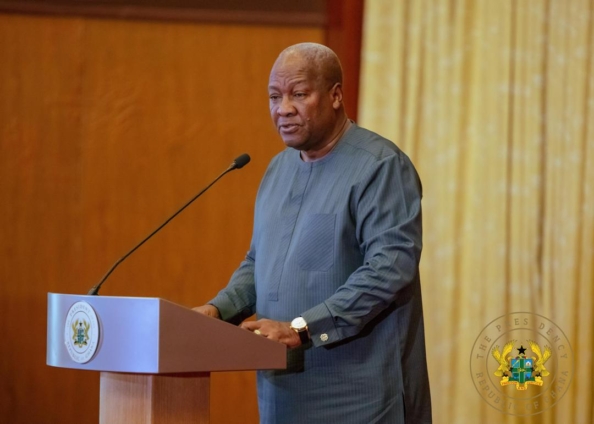adverts
President John Dramani Mahama has stated that his administration has no immediate plans to extend Ghana’s $3 billion Extended Credit Facility (ECF) with the International Monetary Fund (IMF) beyond its current framework.
Speaking in an interview with Bloomberg TV at the Munich Security Conference on Monday, February 17, 2025, President Mahama emphasised that while an extension remains a future possibility, his government’s priority is to stay the course with the existing program.
“We’ve not talked about an extension of the program. We are determined to continue with this program,” Mahama said. “If it’s necessary to look at additional funds or to extend the program, we’ll look at it, but for now, we are determined to continue on this trajectory.”
adverts
The $3 billion IMF-backed ECF, which was approved on May 17, 2023, is designed to support Ghana’s economic recovery by focusing on fiscal consolidation, debt sustainability, and structural reforms.
During discussions with the IMF, President Mahama’s administration presented key economic strategies, with a particular focus on:
- Tax Rationalisation
- Debt Management and Restructuring
- Expenditure Prudence
A major issue raised in the discussions was Ghana’s current tax structure, which Mahama argued had become counterproductive under the previous administration. He criticised the excessive imposition of taxes, stating that it resulted in diminishing returns rather than increased revenue.
“Because of the target of achieving 24 percent revenue to GDP by 2028, the program required that revenue continue increasing at a certain rate. Unfortunately, what the previous government had done was just to slap on more taxes, and we had gotten to a stage where the more taxes that were put on, the less revenue that came in,” he explained.
As part of efforts to enhance tax compliance and efficiency, the IMF has agreed to provide technical assistance in streamlining Ghana’s tax system.
Addressing Ghana’s growing debt burden, President Mahama acknowledged the significant debt repayments due in 2025, particularly domestic debt obligations exceeding $15 billion.
To tackle this challenge, his administration has reactivated Ghana’s sinking fund, a financial reserve dedicated to servicing debt obligations.
“We also have the issue of the debt restructuring and humps that have been created this year; we have to pay in excess of $15 billion on the domestic debt exchange. So what we’ve done is reactivate the sinking fund and put more resources into it to take care of the repayments that have to be made this year.”
Beyond taxation and debt, expenditure control remains a top priority for the government. President Mahama stressed the need to cut wasteful spending and redirect funds toward priority programs.
“We must be more prudent in our handling of our finances; we must also look on the expenditure side and see how we can cut waste and shift resources to more priority programs,” he stated.
Ghana’s next budget presentation in March will reflect recommendations from the IMF’s latest review. The fourth IMF review is scheduled for April 2025, and the government is aligning its fiscal strategies with the findings from ongoing assessments.
“The next review, which will be the fourth review, is due in April, but before that, we’ll present the budget in March. So the budget will take into focus some of the issues that have come out from the IMF staff mission,” Mahama said.
Despite ongoing economic difficulties, Mahama reaffirmed Ghana’s positive relationship with the IMF, describing the partnership as cordial and crucial for economic stability.
His administration remains committed to the successful implementation of the ECF program, ensuring that Ghana emerges stronger and more resilient in its economic recovery efforts.
Click the link Puretvonline.com | WhatsApp Channel to join the WhatsApp channel
GOT A STORY?
Contact/WhatsApp: +233243201960 or Email: manuelnkansah33@gmail.com


